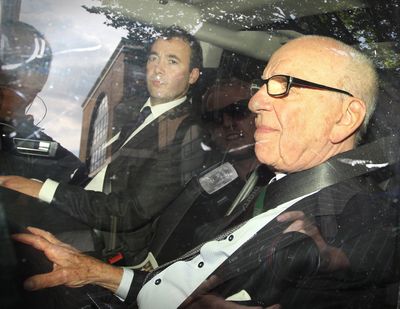Washington Post publisher, incoming editor used stolen records in U.K., former colleague says

LONDON – The publisher and the incoming editor of the Washington Post, when they worked as journalists in London two decades ago, used fraudulently obtained phone and company records in newspaper articles, according to a former colleague, a published account of a private investigator and an analysis of newspaper archives.
Will Lewis, the Post’s publisher, assigned one of the articles in 2004 as business editor of the Sunday Times. Another was written by Robert Winnett, whom Lewis recently announced as the Post’s next executive editor.
The use of deception, hacking and fraud is at the heart of a long-running British newspaper scandal, one that toppled a major tabloid in 2010 and led to years of lawsuits by celebrities who said reporters improperly obtained their personal documents and voicemail messages.
Lewis has maintained that his only involvement in the controversy was helping to root out problematic behavior after the fact, while working for Rupert Murdoch’s News Corp.
But a former Sunday Times reporter said Friday that Lewis had personally assigned him to write an article in 2004 using phone records that the reporter understood to have been obtained through hacking.
After that story broke, a British businessperson who was the subject of the article said publicly that his records had been stolen. The reporter, Peter Koenig, described Lewis as a talented editor – one of the best he had worked with. But as time went on, he said Lewis changed.
“His ambition outran his ethics,” Koenig said.
A second article in 2002 carried Winnett’s byline, and a private investigator who worked for the Sunday Times later publicly acknowledged using deception to land the materials.
Both articles were produced during a period when the newspaper has acknowledged paying the private detective explicitly to obtain material surreptitiously. That would violate the ethics codes of the Post and most American news organizations. The Sunday Times has said repeatedly that it has never paid anyone to act illegally.
A New York Times review of Lewis’ career also raised new questions about his decision in 2009, as editor of the Daily Telegraph in Britain, to pay more than 100,000 pounds for information from a source. Paying for information is prohibited in most American newsrooms.
In a meeting with Post journalists in November, Lewis defended the payments, saying the money had been put into an escrow account to protect a source. But the consultant who brokered the deal said in a recent interview that there had been no escrow account and that he had doled out the money to sources himself.
Subterfuge at the Sunday Times
In 2002, Winnett landed a scoop.
Mercedes was re-releasing the Maybach, a German luxury car that was popular in the 1930s and that the Sunday Times called “the Nazis’ favorite limousine.” Prominent British figures were lining up to place orders. Winnett had a list of names, including a member of the House of Lords.
Many years later, a private investigator named John Ford publicly revealed his long career working for the Sunday Times. He said he had rifled through people’s garbage and surreptitiously gained access to the bank, phone and company records of public figures.
In a 2018 interview with the Guardian, Ford spoke regretfully about his work for a June 2002 article revealing the Maybach buyers. Winnett’s article is the only one that fits that description. But because the original article is not readily available online, it has not been linked publicly to him.
In the Guardian interview, Ford said he had called the Mercedes dealer and, in a fake accent, claimed to be a German key fob manufacturer who needed to see a list of buyers so he could confirm the spellings of their names. The man on the other end of the line was fired after the article ran, he said.
Lewis became business editor in 2002, a few months after the Maybach article ran, and became Winnett’s boss.
In 2004, Lewis pulled another business reporter aside after the regular Tuesday editorial meeting and gave him an assignment, according to the reporter, Koenig.
Koenig recalled in an interview with the New York Times that Lewis told him to look into conversations between two businesspeople involved in the possible sale of a retail chain. Koenig said he was given copies of phone records – he believes by Lewis himself.
“My understanding at the time was that they had been hacked,” Koenig said.
Armed with the records, Koenig said, he persuaded one of the businesspeople, Stuart Rose – who was then CEO of the retailer, Marks & Spencer, and is now a member of the House of Lords – to give him an interview to explain the calls.
The June 2004 article by Koenig contains down-to-the -minute details of Rose’s phone calls. The article did not say where the information had come from.
Koenig said he was almost certain that Lewis edited the article himself.
Lewis wrote a first-person article that same day about Rose and his role in a possible Marks & Spencer deal. In it, Lewis describes personally getting the tip to look into the deal and refers to the phone calls. “I am told Rose started Friday, May 7, with a call to his public relations adviser,” Lewis wrote.
And in a separate article also written by Lewis and published that day, he takes note of the precise timing of another phone call.
Days later, Marks & Spencer announced that Rose’s phone records had been hacked.
Lewis has said little over the years about the phone hacking scandal. When he has discussed it, he has presented himself as someone who cooperated with the authorities and helped News Corp root out wrongdoing.
“My role was to put things right, and that is what I did,” he told the BBC in 2020.
This article originally appeared in {a href=”https://www.nytimes.com/2024/06/15/world/europe/will-lewis-records-uk-editor.html”}The New York Times{/a}.